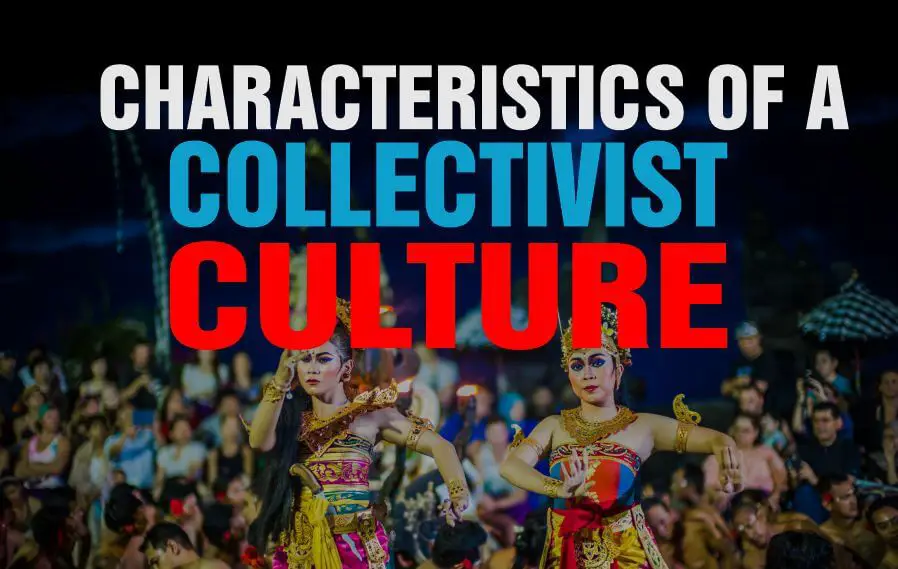Understanding the characteristics of a collectivist culture is essential for navigating cross-cultural interactions and effective communication.
In a collectivist society, the emphasis is placed on the group rather than the individual.
This cultural orientation values harmony, cooperation, and interdependence among its members.
Some key traits include a strong sense of community, loyalty to the group, prioritizing the needs of the collective over personal desires, conformity to social norms, and a focus on maintaining social harmony.
Let’s examine these characteristics further to gain a deeper understanding of collectivist cultures.
20 Characteristics of a Collectivist Culture and Society
1. Group-oriented
Group-oriented is one of the characteristics of Collectivist culture, where the goals, needs, and priorities of the group are prioritized over individual interests.
Individuals strive to maintain harmony, cooperation, and consensus within the group.
Group members are expected to be loyal, supportive, and committed to the collective well-being.
Decisions are often made collectively, and individual achievements are celebrated as contributions to the overall success of the group.
2. Interdependence
Interdependence is a fundamental characteristic of a collectivist society. It refers to the reliance and interconnectedness among individuals within the group.
In such a society, people recognize that their actions and decisions have an impact on others, and they put the well-being of the collective first over personal interests.
Interdependence encourages cooperation, collaboration, and a sense of shared responsibility.
It encourages individuals to work together towards common goals, pooling resources and efforts for the benefit of the entire group.
3. Cohesion
Cohesion is a significant characteristic of a collectivist society where there is a strong sense of unity and togetherness among its members.
Cohesion is enhanced through shared values, traditions, and a collective identity.
People in collectivist societies tend to form close-knit social networks and maintain strong bonds with family, friends, and community members.
This sense of cohesion promotes cooperation, support, and a collective sense of belonging, reinforcing the fabric of the society.

4. Loyalty
Loyalty is a prominent trait in collectivist cultures. It signifies a strong commitment and allegiance to the group, whether it be family, community, or organization.
Loyalty is demonstrated through unwavering support, trust, and dedication to the group’s goals and values within society.
Related Posts
What is Cultural Intelligence?
What is Individuality Culture?
Pros and Cons of Hyper Individualism
Why You Should Embrace Selfhood
Merits and Demerits of Living in a Collectivist Culture
How to Overcome Individuality Complex
5. Conformity
In a collectivist society, conformity is highly valued as individuals value adhering to social norms and expectations.
The emphasis is on fitting in and maintaining harmony rather than standing out or asserting individuality.
No matter your inclination or opinion as an individual, you must conform to what society wants.
6. Group Harmony
Collectivist societies value maintaining group harmony and unity.
Group members willingly conform to social norms, and decisions are made collectively for the betterment of the group.
People seek to avoid conflict or disputes that could disrupt the overall balance and well-being of the collective, valuing cooperation and consensus.
7. Cooperation
Cooperation is a key characteristic of collectivist societies.
Collaboration and mutual support are prioritized to achieve collective success rather than individual accomplishments or competition.
The entire society is tied to their pride and what makes it thick. This makes individuals give up or not have personal pursuits at all as they owe society their allegiance.

8. Collective Decision-making
Collective decision-making is a characteristic of collectivist cultures where decisions are made by the group as a whole rather than by individuals.
The opinions and perspectives of all members are valued and considered before arriving at a decision.
This approach emphasizes cooperation, consensus, and the prioritization of the group’s needs and goals over individual desires or preferences.
Related: What is Rugged Individualism?
9. Group Reputation
Group reputation is the importance placed on the image and perception of a collective or community in collectivist cultures.
Maintaining a positive group reputation is crucial for social cohesion and harmony.
Behaviors, values, and actions that uphold the reputation of the group are encouraged, while those that can potentially harm or disgrace the group are discouraged or even punished.
People are conscious of how their actions reflect upon the group and strive to maintain a positive image. Collective honor and face come first before individual recognition or achievement.
10. Shared Responsibility
In a collectivist culture, shared responsibility is a key trait where individuals within the community view themselves as interconnected and interdependent.
They place more importance on the needs and goals of the group over personal desires, working together to achieve collective success.
This trait helps form a sense of unity, collaboration, and mutual support, as everyone has a role and contributes to the well-being and progress of the community as a whole.
Everyone is expected to contribute and fulfill their role to maintain the collective’s welfare, be it in family, community, or work contexts. Individual success is often linked to the success of the collective.
11. Sacrifice for the Greater Good
In a collectivist society, sacrificing for the greater good involves willingly giving up or compromising personal gains, comfort, or resources for the betterment of the whole.
The notion of sacrifice in this context reflects a strong sense of interdependence, cooperation, and a belief that collective well-being is paramount to individual satisfaction and success.
People are willing to make personal sacrifices for the betterment of the group or community.
12. Strong Social Support
Strong social support is a trait commonly found in collectivist societies.
Members of the community are imbued with a strong sense of community and interconnectedness.
They actively contribute to the well-being of others, providing emotional, financial, and practical support.
The importance of social relationships and connections is deeply ingrained in their cultural values, encouraging a sense of belonging and collective responsibility.
13. Collective Identity
Collective identity is a key trait of a collectivist society. It is the shared sense of belonging and identification with the group.
Members of the community derive their sense of self and identity from their membership in the collective, whether it be based on nationality, ethnicity, or other social affiliations.
Collective identity is reinforced through shared customs, traditions, language, and values, creating a strong bond and a collective consciousness that shapes the behavior and attitudes of individuals within the society.
14. Respect for Authority
Respect for authority in collectivist cultures reflects a societal emphasis on hierarchy, conformity, and obedience.
It underscores the significance of deferring to established social structures and figures of authority, such as elders, leaders, or traditional values.
This trait reinforces cohesion and stability within the community by promoting unity and cooperation based on shared respect for those in positions of power or wisdom.
15. Emphasis on Long-term Relationships
In collectivist societies, the emphasis on long-term relationships signifies the importance of enduring connections over time.
These cultures prioritize loyalty and mutual support among family, friends, and social networks.
Maintaining relationships over the long haul encourages trust, reciprocity, and a sense of interconnectedness, contributing to social harmony.
It underscores the idea that your well-being is intertwined with the well-being of your social group, reinforcing a commitment to nurturing lasting bonds.
16. Group Consensus
Group consensus is a characteristic of collectivist cultures where decisions are made collectively.
It reflects the value placed on harmony and cooperation within the group.
Individuals in such cultures prioritize reaching a unanimous agreement through discussion and compromise, ensuring that everyone’s perspectives are considered.
This approach creates a sense of belonging and shared responsibility, contributing to social cohesion.
It may, at times, prioritize group harmony over individual opinions, promoting unity and cooperation in decision-making processes.
17. Social Hierarchy
Social hierarchy is a prominent characteristic in collectivist societies, where members’ roles and status within the community are clearly defined and respected.
This hierarchy is typically based on factors like age, gender, and societal roles.
It encourages stability and order by emphasizing obedience and deference to those in higher positions.
This structure reinforces the collective identity and social cohesion, as people find security and identity within their designated roles and their place in the social pecking order.
18. Interpersonal Harmony
Interpersonal harmony is a key trait of collectivist cultures, emphasizing the importance of maintaining smooth and cooperative relationships within the community.
These societies value avoiding conflict and valuing group cohesion over personal differences.
People in collectivist cultures often employ politeness, compromise, and empathy to preserve harmonious interactions, contributing to a sense of unity and shared values.
Interpersonal harmony helps in maintaining stability and mutual support, enhancing the overall social fabric and collective well-being.
19. Avoidance of Self-promotion
In collectivist cultures, there is a strong inclination to avoid self-promotion.
Individuals value humility and modesty over drawing attention to their own achievements or abilities.
Instead, the focus is on highlighting the group’s accomplishments and contributing to the collective’s success.
This trait promotes a sense of interconnectedness and minimizes the risk of appearing boastful or self-centered, reinforcing the community’s cohesion and shared values, where individual achievements are downplayed in favor of the group’s collective identity.
20. Mindfulness of Other’s Needs
Mindfulness of the needs of others is a hallmark of collectivist cultures. In these societies, you are attuned to the well-being and preferences of those around you.
People value accommodating and supporting the needs of family, friends, and the larger community.
This trait helps for a strong sense of interconnectedness and reciprocity, emphasizing the importance of collective welfare.
It encourages empathy and selflessness, promoting social harmony and reinforcing the notion that individuals are deeply interdependent within the group.
Frequently Asked Questions
What are the characteristics of a collectivist culture?
A collectivist culture is characterized by a focus on the group, interdependence, loyalty, cohesion, and a strong collective identity.
What are the 2 characteristics of collectivist culture?
Two key characteristics of collectivist culture are prioritizing the needs of the group over personal desires and emphasizing harmony and cooperation among its members.
What is the main focus of a collectivist culture?
The main focus of a collectivist society is on the group rather than the individual, emphasizing cooperation, interdependence, and harmony.
How does collectivist culture differ from individualistic culture?
Collectivist culture values the needs of the group, while individualistic culture emphasizes personal goals and independence.
What role does loyalty play in a collectivist culture?
Loyalty is highly valued in collectivist societies, as individuals value the the well-being and interests of the group over personal gain.
How does a collectivist culture encourage cohesion?
Cohesion is encouraged through shared values, traditions, and a strong sense of unity, promoting cooperation and support among group members.
What is the significance of collective identity in a collectivist society?
Collective identity creates a sense of belonging and shapes individuals’ behavior and attitudes, as they derive their sense of self from their group membership.
Finally
A collectivist culture can be characterized by a range of distinct features.
These include an emphasis on group harmony, interdependence, hierarchical social structures, strong family ties, and a sense of duty towards the collective.
Additionally, collectivist societies tend to value conformity, obedience, respect for authority, and cooperation over individuality and personal achievement.
These characteristics shape the values, behaviors, and relationships within a collectivist society.
Understanding these traits is crucial for encouraging cross-cultural understanding and effective communication in an increasingly interconnected world.
References:
- https://www.ncbi.nlm.nih.gov/pmc/articles/PMC5619823/
- https://www.simplypsychology.org/what-are-collectivistic-cultures.html
Pyo Merez (PsyD) is a distinguished adolescent and adult psychologist at the forefront of mental health advocacy.
With expertise in cognitive and developmental psychology, focusing on social relationships, cultural contexts, and individual differences, Pyo has dedicated his career to empowering adolescents and adults.
As a sought-after speaker and panelist, Pyo shares invaluable insights on issues affecting young people, contributing to a deeper understanding of mental health and well-being in today's society.

